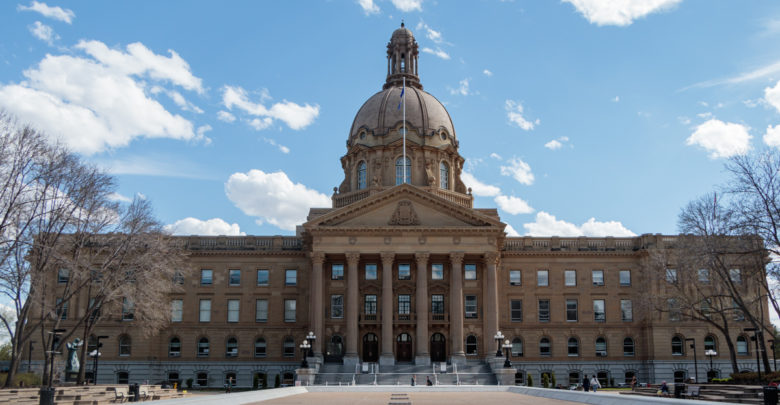Members of roundtable on campus free speech see provincial government stance as “political theatre”
The divisive topic resulted in a multiplicity of opinions from attendants.
 Christien Ford
Christien FordSince their appointment to office in 2019, Alberta’s United Conservative government has said one of their priorities is protecting free speech on university campuses.
This focus was examined at a roundtable, hosted by the U of A’s political science department on November 16. The event brought in four speakers from Canadian universities to discuss policy decisions made by the provincial governments of Alberta and Ontario. Both governments have called attention to what they have outlined as a crisis in free speech.
The roundtable brought into question whether the state of free speech on campuses can truly be called a crisis at all.
Richard Moon, a law professor at the University of Windsor, said that to him, it seems controversies surrounding free speech are probably “no more frequent and no more severe” than they were in the past.
“We talk about a free speech crisis when there’s not really one at all,” he said “What there is is a crisis in public discourse … there is a problem or unwillingness to engage with one another. There is no longer shared agreement or understanding of reliable or trusted sources of information, and as a result there’s a spread of disinformation.”
Katja Thieme, an associate professor of english at the University of British Columbia (UBC), noted she finds it odd that government demand about free speech protections seems to be focused specifically on higher education.
“If a government is concerned about free speech, why only on campuses?” she said. “These attempts by both premiers go against the autonomous status of universities and colleges, and against the need for Canadian institutions to think through implications of free speech in relation to other rights and values that are also rooted on campuses and in canadian legal frameworks.”
Thieme said that while universities have adopted certain free speech principles, these statements often assert free speech as the primary right over others.
“The work of pushing back against speech that for instance valorizes white supremacy or transphobia is thereby often delegated to those most vulnerable to the harm and intimidation these claims produce,” she said. “[The principles] suggest you fight it out amongst yourselves because the university will not protect you.”
Members of roundtable suggest that conservative focus on campus free speech focus is “political theatre”
When asked by D’Orazio what effect the ministerial directives might have on campus expression, many panelists agreed that the effect would be negligible.
“I see this as a kind of political theatre,” said Samir Gandesha, a humanities professor at Simon Fraser University. “It’s a way for these conservative governments to position themselves to grandstand. What really should be further remarked upon is the institutional problems the universities are facing.”
Gandesha argued that because public funding for universities has waned in the past few decades, universities are now engaged in relationships with private donors that might influence their abilities to foster free speech.
“We’re also seeing increased precariousness with academic labour,” he said. “Tenure is on decline, and this contributes to significant pressure on freedom of expression within the university.”
Moon agreed with Gandesha’s “political theatre” assessment, and noted that free speech has become a kind of strategic term to obscure other ideologies.
“Presenting yourself as a defender of free speech can often be a more palatable way to protect yourself,” he said.
He added that an emphasis on freedom of speech can also take on a racist and culturist turn when it is held up as an ideal of Western civilization.
“There is often an implication in these statements that new immigrants might not appreciate the values that the Western society might protect,” Moon said.
Moon agreed with Gandesha, calling the invocation of these policies by Albertan and Ontarian governments a “matter of optics.”
U of A professor questions actions from colleagues
Judith Garber, an associate professor in political science at the U of A and audience member, posed a question at the end of the panel about an event that happened in 2019, where a professor at the U of A made comments on Facebook denying the Holodomor.
“Some professors at the U of A, including friends of mine, defended this person on the basis of our spiffy new free speech principles,” she said. “They defended him in the face of well crafted and genuine criticism coming from students.”
Garber noted that she saw many students upset by what was a move to uphold free speech no matter what the cost or who it harmed.
“My question is who is the university,” she said. “Is it the students, or is it the professors?”
Due to time constraints, response to her question was cut short, with only a short statement from Thieme being allowed.
“I hope the professor’s employment was not affected by their speech,” she said.
In a statement to The Gateway after the event, Thieme added on to her comment.
“Underlying my point (something I did not have time to express) is that statements like the one referenced must be challenged,” she said.
“The call for terminating or not renewing someone’s contract brings in other questions: universities as employers have to abide by employment law and collective agreements, and in that process should limit their consideration of someone’s speech to speech produced on the job.”




